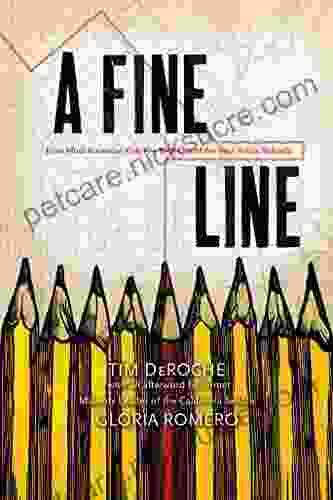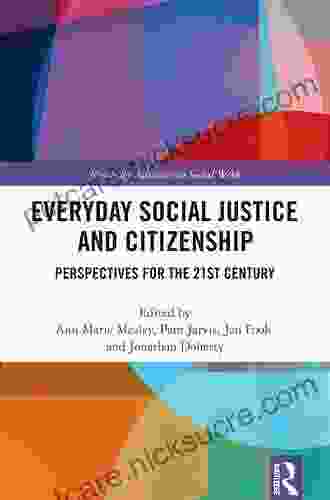How America's Broken School System Perpetuates Inequality: The Systemic Exclusion of Children from Top Public Schools


In the United States, the quality of education that a child receives is heavily dependent on their family's socioeconomic status. This is due in part to the fact that the funding for public schools is largely based on local property taxes. As a result, schools in affluent areas tend to have more resources than schools in poor areas. This disparity in resources can have a significant impact on the educational opportunities available to children.
4.1 out of 5
| Language | : | English |
| File size | : | 6820 KB |
| Text-to-Speech | : | Enabled |
| Screen Reader | : | Supported |
| Enhanced typesetting | : | Enabled |
| Word Wise | : | Enabled |
| Print length | : | 280 pages |
| Lending | : | Enabled |
One of the most troubling consequences of this funding inequity is that it leads to the exclusion of many children from the best public schools. This is because the best public schools are often located in affluent areas, and families who cannot afford to live in these areas are effectively shut out of these schools.
The exclusion of children from the best public schools is a serious problem for several reasons. First, it perpetuates inequality by giving children from wealthy families a significant advantage over children from poor families. Second, it deprives children from poor families of the opportunity to receive the best possible education, which can have a lasting impact on their future success. Third, it undermines the public school system as a whole by making it less equitable and effective.
The Causes of School Segregation
There are a number of factors that contribute to the segregation of schools in the United States. One factor is residential segregation, which is the tendency for people of different races and socioeconomic statuses to live in separate neighborhoods. This is often the result of discrimination in housing, such as redlining, which was a practice of denying mortgages to people of color in certain neighborhoods.
Another factor that contributes to school segregation is the way that school districts are drawn. School districts are typically drawn by local governments, and these governments often have an interest in maintaining the status quo. As a result, school districts are often drawn in a way that reinforces residential segregation.
Finally, school segregation is also perpetuated by the choices that families make about where to send their children to school. Some families choose to send their children to private schools, which are often more expensive than public schools. Others choose to send their children to schools in affluent areas, even if they do not live in those areas. These choices can further contribute to the segregation of schools.
The Consequences of School Segregation
The consequences of school segregation are far-reaching. For children who are excluded from the best public schools, it can mean a significant disadvantage in terms of their education and future success. Studies have shown that children who attend segregated schools are more likely to drop out of school, have lower test scores, and earn less money as adults.
School segregation also has a negative impact on the public school system as a whole. When schools are segregated, it becomes more difficult to provide all children with a quality education. This is because segregated schools often have fewer resources and less experienced teachers. As a result, all children in the public school system suffer.
Solutions to School Segregation
There are a number of things that can be done to address the problem of school segregation. One solution is to increase funding for public schools in poor areas. This would help to level the playing field between schools in affluent and poor areas.
Another solution is to redraw school district lines in a way that promotes integration. This would require local governments to take a more active role in desegregating schools.
Finally, families can also play a role in desegregating schools by choosing to send their children to schools in diverse areas, even if they do not live in those areas. This would help to create a more integrated school system that benefits all children.
School segregation is a serious problem in the United States. It perpetuates inequality, deprives children from poor families of the opportunity to receive the best possible education, and undermines the public school system as a whole. There are a number of things that can be done to address this problem, including increasing funding for public schools in poor areas, redrawing school district lines, and encouraging families to choose schools in diverse areas. By working together, we can create a more equitable and effective school system that benefits all children.
4.1 out of 5
| Language | : | English |
| File size | : | 6820 KB |
| Text-to-Speech | : | Enabled |
| Screen Reader | : | Supported |
| Enhanced typesetting | : | Enabled |
| Word Wise | : | Enabled |
| Print length | : | 280 pages |
| Lending | : | Enabled |
Do you want to contribute by writing guest posts on this blog?
Please contact us and send us a resume of previous articles that you have written.
 Fiction
Fiction Non Fiction
Non Fiction Romance
Romance Mystery
Mystery Thriller
Thriller SciFi
SciFi Fantasy
Fantasy Horror
Horror Biography
Biography Selfhelp
Selfhelp Business
Business History
History Classics
Classics Poetry
Poetry Childrens
Childrens Young Adult
Young Adult Educational
Educational Cooking
Cooking Travel
Travel Lifestyle
Lifestyle Spirituality
Spirituality Health
Health Fitness
Fitness Technology
Technology Science
Science Arts
Arts Crafts
Crafts DIY
DIY Gardening
Gardening Petcare
Petcare Derek Rowntree
Derek Rowntree Dorthe Berntsen
Dorthe Berntsen Karen L Cox
Karen L Cox Jamil Zaki
Jamil Zaki Glenda Green
Glenda Green Randall M Packard
Randall M Packard Joanne Calderwood
Joanne Calderwood Nicole Zasowski
Nicole Zasowski Jeanne Oliver
Jeanne Oliver David Fine
David Fine Wendy Higgins
Wendy Higgins Six Sisters Stuff
Six Sisters Stuff Amanda Brooks
Amanda Brooks Piotr Naskrecki
Piotr Naskrecki Os Guinness
Os Guinness Felicia Pizzonia
Felicia Pizzonia Traci Chee
Traci Chee Jason Sumner
Jason Sumner John Toussaint
John Toussaint Harry Fisch
Harry Fisch Robert Lomas
Robert Lomas Norman Delgado
Norman Delgado Linda L French
Linda L French Hafsah Faizal
Hafsah Faizal Graham Priest
Graham Priest Gerd Gigerenzer
Gerd Gigerenzer Susan Ludington Hoe
Susan Ludington Hoe Paul Freedman
Paul Freedman Frank Wilczek
Frank Wilczek Ewan Mcgregor
Ewan Mcgregor Andy Kirkpatrick
Andy Kirkpatrick 1st Ed 2020 Edition Kindle Edition
1st Ed 2020 Edition Kindle Edition Jill Heinerth
Jill Heinerth Tillie Cole
Tillie Cole Brian Fagan
Brian Fagan Barry Ord Clarke
Barry Ord Clarke Jacqueline Corricelli
Jacqueline Corricelli Ivana Bajic Hajdukovic
Ivana Bajic Hajdukovic Geraint Thomas
Geraint Thomas Tom Chivers
Tom Chivers Anne Polli
Anne Polli Phil Mickelson
Phil Mickelson Monte Burch
Monte Burch Mary Douglas
Mary Douglas Ruth Ware
Ruth Ware Cathy Hester Seckman
Cathy Hester Seckman Harold Simmons
Harold Simmons Mark Seidenberg
Mark Seidenberg Hannu Rajaniemi
Hannu Rajaniemi Jeff Benedict
Jeff Benedict Gary E Schwartz
Gary E Schwartz Emily Vikre
Emily Vikre Diana Papaioannou
Diana Papaioannou Rachael Bell Irving
Rachael Bell Irving Jim Baggott
Jim Baggott Pat Manley
Pat Manley Mara Rutherford
Mara Rutherford Maia Motley
Maia Motley Ann Jackson
Ann Jackson Timothy R Pauketat
Timothy R Pauketat Irina Szmelskyj
Irina Szmelskyj Dk Publishing
Dk Publishing Taran Matharu
Taran Matharu Ben Rothenberg
Ben Rothenberg Orji Onyebuchi
Orji Onyebuchi Brent Warner
Brent Warner Sarah A Clark
Sarah A Clark Modestus Anabaraonye
Modestus Anabaraonye David Kahn
David Kahn Mark Miller
Mark Miller Kyler Shumway
Kyler Shumway Bruce Chatwin
Bruce Chatwin Richard Pears
Richard Pears Joachim Rossberg
Joachim Rossberg Bill Douglas
Bill Douglas Evy Poumpouras
Evy Poumpouras Jeremy Bhandari
Jeremy Bhandari Sara Saedi
Sara Saedi Editions La Plume D Eros
Editions La Plume D Eros Nageshwar Sah
Nageshwar Sah Janice Hudson
Janice Hudson The Lodge Company
The Lodge Company Michael Schiavone
Michael Schiavone Latham Thomas
Latham Thomas Lisa Marasco
Lisa Marasco Shane Benzie
Shane Benzie James Ragonnet
James Ragonnet Elizabeth Becker
Elizabeth Becker M L Buchman
M L Buchman Karina Manta
Karina Manta Raven Morgaine
Raven Morgaine John Vigor
John Vigor Sarah Lawton
Sarah Lawton Diane Vaughan
Diane Vaughan Gail Buckland
Gail Buckland Michelle Damiani
Michelle Damiani Marisa Kanter
Marisa Kanter Laura Luther
Laura Luther Kay Kennedy
Kay Kennedy Ejike Ifeanyichukwu
Ejike Ifeanyichukwu Liz Thomas
Liz Thomas Franz Boas
Franz Boas Wabun Wind
Wabun Wind Michael R Canfield
Michael R Canfield 1st Ed 2016 Edition Kindle Edition
1st Ed 2016 Edition Kindle Edition Raichelle Carter
Raichelle Carter Karyn Garvin
Karyn Garvin Russ Moorhouse
Russ Moorhouse Alison Gopnik
Alison Gopnik Heather A Smith
Heather A Smith Sean Fitz Gerald
Sean Fitz Gerald Joshua G Shifrin
Joshua G Shifrin David Wolff
David Wolff Mike Chappell
Mike Chappell Tim Deroche
Tim Deroche Ron Larson
Ron Larson Fletcher Dunn
Fletcher Dunn Carola Hein
Carola Hein Steve Crawford
Steve Crawford H Lee Jones
H Lee Jones Lani Forbes
Lani Forbes Chris J Ellis
Chris J Ellis Daniel Todd Gilbert
Daniel Todd Gilbert Erfun Geula
Erfun Geula Sally A Lipsky
Sally A Lipsky Paul Haddad
Paul Haddad Patricia B Mcconnell
Patricia B Mcconnell My Daily German
My Daily German Mark Lattanzi
Mark Lattanzi Lh Press
Lh Press Rollo Tomassi
Rollo Tomassi Patricia G Lange
Patricia G Lange Will Nett
Will Nett Peter Heller
Peter Heller Bud Hasert
Bud Hasert Gill Stewart
Gill Stewart David Clark
David Clark Ann Olga Koloski Ostrow
Ann Olga Koloski Ostrow Florence Nightingale
Florence Nightingale Cal Peternell
Cal Peternell Ric Conrad
Ric Conrad Beryl Beare
Beryl Beare Michael T Mcdermott
Michael T Mcdermott David Weber
David Weber Ian Sample
Ian Sample Kathleen Buckstaff
Kathleen Buckstaff Ashley Stanford
Ashley Stanford Anton Angelov
Anton Angelov Belinia Xenrale
Belinia Xenrale Natalia Molina
Natalia Molina Brian Meier
Brian Meier Claire Dunn
Claire Dunn Richard E Nisbett
Richard E Nisbett Morten H Christiansen
Morten H Christiansen George Mount
George Mount Clifford E Trafzer
Clifford E Trafzer Jandy Nelson
Jandy Nelson Forrest Willett
Forrest Willett Valerie Nash Chang
Valerie Nash Chang Geoff Johns
Geoff Johns Dana Trentini
Dana Trentini Thomas Lickona
Thomas Lickona Mindfulness Hypnosis Academy
Mindfulness Hypnosis Academy Lawrence T Friedhoff
Lawrence T Friedhoff Katie Singer
Katie Singer Alexandre Paiva
Alexandre Paiva Cathy Raubenheimer
Cathy Raubenheimer Nancy Hendrickson
Nancy Hendrickson Rana Conway
Rana Conway Jay Carter
Jay Carter Jacob Stegenga
Jacob Stegenga Christopher Hook
Christopher Hook Desiree Trattles
Desiree Trattles Louise Warneford
Louise Warneford Jonathan Tarbox
Jonathan Tarbox Wendy Sullivan
Wendy Sullivan Judith Warner
Judith Warner Mambo Chita Tann
Mambo Chita Tann Jeffrey S Saltz
Jeffrey S Saltz Amanda Claridge
Amanda Claridge Susan Alcorn
Susan Alcorn Elizabeth Field
Elizabeth Field Alice Roberts
Alice Roberts Mayim Bialik
Mayim Bialik Darril Fosty
Darril Fosty 1st Ed 2019 Edition Kindle Edition
1st Ed 2019 Edition Kindle Edition Sophie Kinsella
Sophie Kinsella Naomi Moriyama
Naomi Moriyama Sandra Uwiringiyimana
Sandra Uwiringiyimana Aaron T Beck
Aaron T Beck Elaine Heney
Elaine Heney Dr Mike Grevlos
Dr Mike Grevlos Tim Powers
Tim Powers Robyn Hawkins
Robyn Hawkins Christian Straube
Christian Straube Vikas Bhushan
Vikas Bhushan Joyce L Vedral
Joyce L Vedral Jean Yves Leloup
Jean Yves Leloup Alex Hibbert
Alex Hibbert Zachary Willey
Zachary Willey Ashlee Kasten
Ashlee Kasten Erin Miller
Erin Miller Ben Coates
Ben Coates Scott Matthews
Scott Matthews 1st Ed 2017 Edition Kindle Edition
1st Ed 2017 Edition Kindle Edition Estelle Maskame
Estelle Maskame Eric Sevareid
Eric Sevareid Jean Pierre De Caussade
Jean Pierre De Caussade Larry A Yff
Larry A Yff Rick Barba
Rick Barba Kristen Thrasher
Kristen Thrasher Philip Moore
Philip Moore J F Tamayo
J F Tamayo R J Vickers
R J Vickers Webb Chiles
Webb Chiles Egerton Ryerson Young
Egerton Ryerson Young Perre Coleman Magness
Perre Coleman Magness Grace Liu
Grace Liu Jon Young
Jon Young Amanda Kingloff
Amanda Kingloff Mike Barrett
Mike Barrett Bilingual Edition Kindle Edition
Bilingual Edition Kindle Edition John Small
John Small R I Chalmers
R I Chalmers Philippa Langley
Philippa Langley Helen Batten
Helen Batten David Roberts
David Roberts William E Glassley
William E Glassley Jane Yeadon
Jane Yeadon Paul A Laviolette
Paul A Laviolette Holly Hook
Holly Hook Guillermo Gonzalez
Guillermo Gonzalez Lindsey Bliss
Lindsey Bliss John S Farnam
John S Farnam David Barrett
David Barrett Robert Oerter
Robert Oerter Stephen Bodio
Stephen Bodio Jesse M Ehrenfeld
Jesse M Ehrenfeld Andrea Sfiligoi
Andrea Sfiligoi Denis Dwyer
Denis Dwyer Dan Robson
Dan Robson Pam Jarvis
Pam Jarvis Nancy B Rapoport
Nancy B Rapoport Matthew Dworak
Matthew Dworak Wolfgang Jank
Wolfgang Jank James M Tabor
James M Tabor Marva Collins
Marva Collins Charlotte Eliopoulos
Charlotte Eliopoulos Kaoru Sinozaki
Kaoru Sinozaki Bradmd
Bradmd Felicity Cloake
Felicity Cloake Eryk Lewinson
Eryk Lewinson George Grimm
George Grimm Peter Hessler
Peter Hessler Hana Ali
Hana Ali Adeline Yen Mah
Adeline Yen Mah Stacey Steinberg
Stacey Steinberg Joan Ryan
Joan Ryan Xiufeng Liu
Xiufeng Liu Elise Hennessy
Elise Hennessy Adam Rutherford Phd
Adam Rutherford Phd Carol Matsuzaki
Carol Matsuzaki House Of Talent
House Of Talent Michael Borenstein
Michael Borenstein Steve Garratt
Steve Garratt Jo Bartlett
Jo Bartlett Suzy Hopkins
Suzy Hopkins Kara Goucher
Kara Goucher Chris Parsons
Chris Parsons Michael Ross
Michael Ross Larry Kaniut
Larry Kaniut Caroline Fidanza
Caroline Fidanza Terry Pratchett
Terry Pratchett Botros Rizk
Botros Rizk Alison Pray
Alison Pray Jareth Tempest
Jareth Tempest Chad Waterbury
Chad Waterbury Leonard Sax
Leonard Sax Teddy Atlas
Teddy Atlas Edward A Bell
Edward A Bell Robert Irwin
Robert Irwin Megan Sloan
Megan Sloan Livy
Livy Ellie Marney
Ellie Marney Francis L Macrina
Francis L Macrina Shane Jones
Shane Jones John L Havlin
John L Havlin Clark A Campbell
Clark A Campbell Otto Toeplitz
Otto Toeplitz Gary Dierking
Gary Dierking Natsuki Takaya
Natsuki Takaya Dylan Dethier
Dylan Dethier Edward Marston
Edward Marston Mark Vee John
Mark Vee John Yaron Seidman
Yaron Seidman Duncan Hamilton
Duncan Hamilton Andrew Solomon
Andrew Solomon James Proctor
James Proctor Taylor Fontenot
Taylor Fontenot Robert Lanza
Robert Lanza Michael Archer
Michael Archer Adam Cesare
Adam Cesare Nicole Libin Phd
Nicole Libin Phd Nick Redfern
Nick Redfern Didier Reiss
Didier Reiss Richard Hofstadter
Richard Hofstadter Isa Herrera
Isa Herrera Christopher Carter
Christopher Carter Nicholas J Saunders
Nicholas J Saunders Alan Naldrett
Alan Naldrett Jamie Whyte
Jamie Whyte Joshua Darwin
Joshua Darwin Karl Rehn
Karl Rehn John T Cacioppo
John T Cacioppo Kev Reynolds
Kev Reynolds Leslie Anthony
Leslie Anthony Lenora Chu
Lenora Chu Philip Coppens
Philip Coppens Joseph Mercola
Joseph Mercola Alan Greenfield
Alan Greenfield Mark Santino
Mark Santino Ray Mcnulty
Ray Mcnulty Julia Rutland
Julia Rutland Irene Spencer
Irene Spencer S K Gupta
S K Gupta 1st Ed 2021 Edition Kindle Edition
1st Ed 2021 Edition Kindle Edition Tadahiko Mizuno
Tadahiko Mizuno Jeremy Lent
Jeremy Lent Jacob Cohen
Jacob Cohen Launi Meili
Launi Meili Ukay J Ekong
Ukay J Ekong Julie Angus
Julie Angus Alexandra Kenin
Alexandra Kenin Kiley Reid
Kiley Reid Robin Hobb
Robin Hobb Stanley Vast
Stanley Vast Phyllis Franklin
Phyllis Franklin Mildred Council
Mildred Council Bob Allcorn
Bob Allcorn Elizabeth Heavey
Elizabeth Heavey Teri Tom
Teri Tom Lisa R Cohen
Lisa R Cohen Sharon Wilkins
Sharon Wilkins Robert Clifton Robinson
Robert Clifton Robinson Jamie Dorobek
Jamie Dorobek Alan Agresti
Alan Agresti Janet Malcolm
Janet Malcolm Pete Magill
Pete Magill Lei Wang
Lei Wang Shalini Shankar
Shalini Shankar 1st Edition Kindle Edition
1st Edition Kindle Edition Rebekah Dodson
Rebekah Dodson Kim Dwinell
Kim Dwinell Asti Hustvedt
Asti Hustvedt Stephen C Meyer
Stephen C Meyer Evelyn Raab
Evelyn Raab Brent E Turvey
Brent E Turvey Janice K Ledford
Janice K Ledford Robert Chu
Robert Chu Dierdre Wolownick Honnold
Dierdre Wolownick Honnold Maureen Dempsey
Maureen Dempsey Raymond Arsenault
Raymond Arsenault Seth Tucker
Seth Tucker D James Benton
D James Benton Karen Kovacs
Karen Kovacs S Elia
S Elia Christian Fader
Christian Fader David I Spivak
David I Spivak Lech A Grzelak
Lech A Grzelak Hesam Nemounehkhah
Hesam Nemounehkhah Berkshire K Greene
Berkshire K Greene Vaclav Smil
Vaclav Smil Peter Lightbown
Peter Lightbown Jacob Gardner
Jacob Gardner Brad Myers
Brad Myers Anthony Burgess
Anthony Burgess 15th Edition Kindle Edition
15th Edition Kindle Edition Daniel H Pink
Daniel H Pink Timothy Dickeson
Timothy Dickeson Emily Chetkowski
Emily Chetkowski Monica Beyer
Monica Beyer Fern Nichols
Fern Nichols Sara Snow
Sara Snow Mike Bender
Mike Bender Samuel Owedyk
Samuel Owedyk Jonathan Vaughters
Jonathan Vaughters Alice Waters
Alice Waters Keshia A Case
Keshia A Case Kajal Gupta
Kajal Gupta Kathy Farrokhzad
Kathy Farrokhzad T M Mikita
T M Mikita Neil Sagebiel
Neil Sagebiel Saroo Brierley
Saroo Brierley Lou Nanne
Lou Nanne Nick Morrison
Nick Morrison Larry Krieger
Larry Krieger Rafael Nadal
Rafael Nadal Bill Rodgers
Bill Rodgers Arden Rose
Arden Rose Jerome Rand
Jerome Rand Jay Cassell
Jay Cassell Peter Burns
Peter Burns Knowledge Tree
Knowledge Tree M Susan Lindee
M Susan Lindee Geoff Powter
Geoff Powter Manjit Kumar
Manjit Kumar Kim Mack Rosenberg
Kim Mack Rosenberg Travis Senzaki
Travis Senzaki Deborah Spungen
Deborah Spungen Guy Harrison
Guy Harrison Skylar Kergil
Skylar Kergil Lori Bregman
Lori Bregman Chris Stringer
Chris Stringer James Adams
James Adams Carmen Acevedo Butcher
Carmen Acevedo Butcher Bruce Brown
Bruce Brown Jacqueline Carey
Jacqueline Carey Gary M Schultheis
Gary M Schultheis Chip Ingram
Chip Ingram Leonie Mack
Leonie Mack Craig Clapper
Craig Clapper 1st Ed 2018 Edition Kindle Edition
1st Ed 2018 Edition Kindle Edition Burt L Standish
Burt L Standish Tamonya Sands
Tamonya Sands Helen Garabedian
Helen Garabedian Daniel Scott
Daniel Scott Andrew Evans
Andrew Evans Loudell F Snow
Loudell F Snow Carol Lynn Mckibben
Carol Lynn Mckibben Michele Smith
Michele Smith Spire Study System
Spire Study System Arny Alberts
Arny Alberts Sarah Thompson
Sarah Thompson Amita Jassi
Amita Jassi Ronald York
Ronald York Daniel L Schacter
Daniel L Schacter Lars Anderson
Lars Anderson Jody Morse
Jody Morse Daisaku Ikeda
Daisaku Ikeda Bryn Huntpalmer
Bryn Huntpalmer Julie K Briggs
Julie K Briggs Robert Milner
Robert Milner Matthew B Crawford
Matthew B Crawford Roger Frampton
Roger Frampton Diane H Tracey
Diane H Tracey Anthony Haynes
Anthony Haynes Nathan D Lang Raad
Nathan D Lang Raad Sanjay Sarma
Sanjay Sarma Samantha Boardman
Samantha Boardman Charles Fleming
Charles Fleming Lavinia Collins
Lavinia Collins Broccoli Lion
Broccoli Lion Ian Stewart
Ian Stewart Bob Chandler
Bob Chandler Ali Psiuk
Ali Psiuk Janet Godwin
Janet Godwin Jack Newfield
Jack Newfield Mike Lanza
Mike Lanza Gerald Beaudry
Gerald Beaudry Aron Ralston
Aron Ralston Ivor Horton
Ivor Horton Paul Johnson
Paul Johnson Stephen R Lawhead
Stephen R Lawhead Mae Ilami Onyekwum
Mae Ilami Onyekwum R K Agarwal
R K Agarwal Paul Gaskell
Paul Gaskell Derald Wing Sue
Derald Wing Sue Laura Prepon
Laura Prepon Joshua James
Joshua James Dinah Bucholz
Dinah Bucholz Day Schildkret
Day Schildkret Tyler Lansford
Tyler Lansford Sharon Copeland
Sharon Copeland Harvey Penick
Harvey Penick Christa Mackinnon
Christa Mackinnon Doug Degrood
Doug Degrood Paul Annacone
Paul Annacone Disha Experts
Disha Experts Pam Vredevelt
Pam Vredevelt Matthew Harffy
Matthew Harffy Deborah T Goldberg
Deborah T Goldberg Rosemary Ellen Guiley
Rosemary Ellen Guiley Tim Hollister
Tim Hollister Keith Bowden
Keith Bowden Leona S Aiken
Leona S Aiken Lynne Tolley
Lynne Tolley Intelligent
Intelligent David Faulkner
David Faulkner Rachel Reed
Rachel Reed 6th Edition Kindle Edition
6th Edition Kindle Edition Alexandra Witze
Alexandra Witze Andrea Olson
Andrea Olson Robyn Ryle
Robyn Ryle Christine E Sleeter
Christine E Sleeter Michael Clarke
Michael Clarke Sarah A Reinhard
Sarah A Reinhard Robyn Perry Worthington
Robyn Perry Worthington Rebecca Solnit
Rebecca Solnit
Light bulbAdvertise smarter! Our strategic ad space ensures maximum exposure. Reserve your spot today!

 Shannon SimmonsHow to Write an Outstanding Literature Review: A Step-by-Step Guide for...
Shannon SimmonsHow to Write an Outstanding Literature Review: A Step-by-Step Guide for... Todd TurnerFollow ·18.1k
Todd TurnerFollow ·18.1k Robert HeinleinFollow ·13.7k
Robert HeinleinFollow ·13.7k Bill GrantFollow ·17.5k
Bill GrantFollow ·17.5k Arthur MasonFollow ·9.8k
Arthur MasonFollow ·9.8k Jordan BlairFollow ·3.1k
Jordan BlairFollow ·3.1k Xavier BellFollow ·17.9k
Xavier BellFollow ·17.9k Howard PowellFollow ·12.9k
Howard PowellFollow ·12.9k Devon MitchellFollow ·11.9k
Devon MitchellFollow ·11.9k

 Marcus Bell
Marcus BellThe Essential Guide to Angler Quick Reference: Your...
Embark on an unforgettable...

 Juan Butler
Juan ButlerThe Lupatus Stone: A Wicked Conjuring
The Lupatus Stone is a...

 Alvin Bell
Alvin BellUnveiling the Enchanting Memoirs of Lady Hyegyong: A...
In the annals of Korean...

 DeShawn Powell
DeShawn PowellAMC's Best Day Hikes in the Berkshires: Explore Majestic...
The Berkshires, a...

 Clark Campbell
Clark CampbellRewilding The Urban Soul: Reconnecting with Nature in the...
In the heart of sprawling metropolises, where...

 Cruz Simmons
Cruz SimmonsHow to Find Your Family History on a Genealogy Website: A...
Delving into the...
4.1 out of 5
| Language | : | English |
| File size | : | 6820 KB |
| Text-to-Speech | : | Enabled |
| Screen Reader | : | Supported |
| Enhanced typesetting | : | Enabled |
| Word Wise | : | Enabled |
| Print length | : | 280 pages |
| Lending | : | Enabled |










